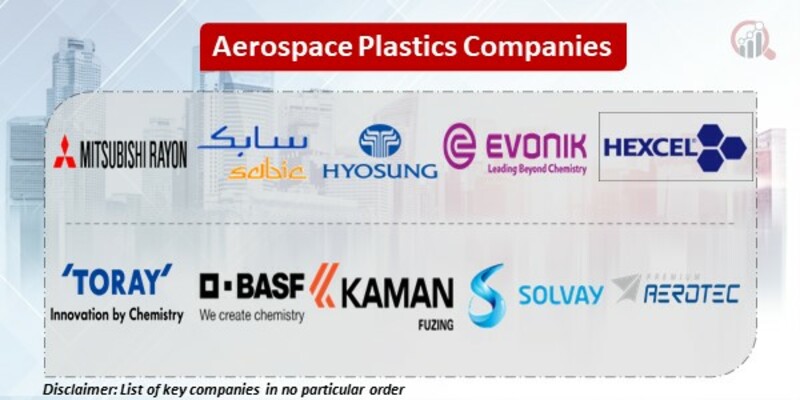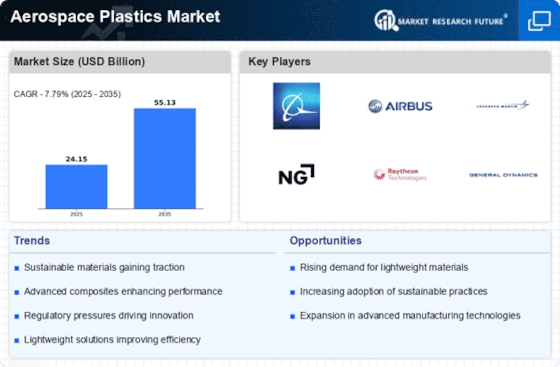Top Industry Leaders in the Aerospace Plastics Market
 Soaring alongside aircraft, the aerospace plastics market is a crucial component of modern aviation. These lightweight, high-performance materials are revolutionizing aircraft design, reducing weight, and improving fuel efficiency. Let's explore the strategies, market share factors, industry news, and recent developments shaping this sky-high landscape.
Soaring alongside aircraft, the aerospace plastics market is a crucial component of modern aviation. These lightweight, high-performance materials are revolutionizing aircraft design, reducing weight, and improving fuel efficiency. Let's explore the strategies, market share factors, industry news, and recent developments shaping this sky-high landscape.
Strategies Adopted by Aerospace Plastics Titans:
-
Material Innovation: Companies like SABIC, Evonik, and Solvay are constantly pushing boundaries with new polymer formulations boasting enhanced strength, heat resistance, flame retardancy, and conductivity. Think polyether ether ketones (PEEKs), polyimides, and advanced composites. -
Diversification: Beyond traditional interior applications, companies are venturing into structural components, propulsion systems, and even radomes. This comprehensive approach caters to various aircraft parts and strengthens market presence. -
Regional Focus: Asia-Pacific, particularly China and India, is witnessing a boom in aircraft production. Companies are establishing partnerships with local manufacturers and building production facilities to capitalize on this surging demand. -
Sustainability Push: Environmental concerns are influencing the market. Companies are developing bio-based plastics, implementing resource-efficient production processes, and exploring ways to recycle used parts, aligning with green initiatives.
Factors Influencing Market Share:
-
Product Portfolio Breadth: Offering a diverse range of plastics for different applications within an aircraft expands market reach and caters to specific needs. -
Quality and Safety: Stringent regulations and concerns about passenger safety demand the highest quality standards and rigorous testing protocols. Consistent compliance and a reliable track record hold an advantage. -
Technical Expertise: Possessing the knowledge and expertise to tailor plastics for specific aerospace applications and integrate them seamlessly into aircraft systems is crucial. -
Collaboration and Partnerships: Partnering with airlines, aircraft manufacturers, and research institutions fosters innovation, facilitates knowledge sharing, and opens doors to new projects.
Key Companies in the Aerospace Plastics market include
-
Hyosung Corporation (South Korea)
-
Mitsubishi Heavy Industries, Ltd. (Japan)
-
Kaman Corporation (US)
-
SABIC (Saudi Arabia)
-
TORAY INDUSTRIES, INC. (Japan)
-
BASF SE (Germany)
-
Evonik Industries AG (Germany)
-
Solvay S.A. (Belgium)
-
Hexcel Corporation (US)
-
Premium AEROTEC (Germany)
Recent Developments:
The collaboration between Toray Industries and Airbus started in March 2024 with the goal of developing advanced thermoplastic composites for applications in aviation. This alliance aspires to make planes lighter, thus cutting weight and subsequently reducing fuel usage, which is a more sustainable way of air travel. As a result, there will be considerable advances in terms of both designing and manufacturing airplanes due to the specific knowledge in relation to such materials from Toray and the global leadership position held by Airbus within its marketplace.
In April 2024, Hexcel Corporation announced that it would increase production capability for advanced composite materials used in aerospace applications. To meet the rising demand for lightweight but strong materials required by aircraft manufacturers, this company disclosed that it had made substantial investments in multiple plants located within the United States and Europe. The expansion aligns with Hexcel’s objective of being the major provider of composite materials used by key players in the aviation business.
Sometime around February 2024, BASF launched a new lineup of high-performance polyamides developed specifically for aerospace application use. Ultramid® Advanced N series comes with enhanced mechanical properties, flame retardancy, and chemical resistance, which make them applicable to various parts found inside aircraft, such as interiors and structural parts. BASF intends to address these demands by introducing a new product line that will be lightweight but still durable, considering its functionality within the aviation domain.
SABIC announced its strategic partnership with Boeing in January 2024, which entails the development of advanced plastics for improved aircraft performance and sustainability. The cooperation focuses on creating innovative materials capable of reducing weight while enhancing fuel efficiency, contributing towards decreased emissions. SABIC has a wide-ranging portfolio of engineering thermoplastics coupled with Boeing’s expertise in aircraft design as some of the possible sources for these aerospace materials being further developed.
In December 2023, DuPont unveiled its latest Kevlar® fibers targeting the aerospace sector. The new offering has improved strength-to-weight ratios and enhanced thermal stability, hence making it suitable for various aerostructures, including fuselage panels and cabin parts. Designing modern aircraft is a challenging task; therefore, DuPont’s innovation looks forward to providing material solutions that meet the requirements of demanding performance on new machines.











